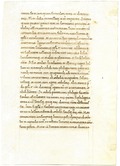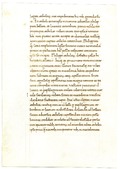Case Western Reserve University Leaf 39
This leaf comes from a rare manuscript of Livy's History of Rome (completed in about 9 A.D.) copied in Italy in the middle of the fifteenth century. It measures 22.5 x 16 cm and its vellum is very well prepared, though some rubbing of the ink has cast a shadow over the text block of some pages. The Humanistic script is crisp, clear, and without adornment; an exception is the Denison leaf, with its striking initial "H." See Denison University Leaf 39 for more information about this manuscript.
Text: This leaf contains the text of Livy's History, Book 26, Chapters 24-25. The English translation is that of Cyrus Edmonds (1850), via Project Gutenberg.
 Case Leaf 39 Recto
Case Leaf 39 Recto
Case Western Reserve University Leaf 39 Recto
 Case Leaf 39 Recto Transcription
Case Leaf 39 Recto Transcription
restituturum se in antiquam formulam iurisque ac dicionis eorum;--haec dicta promissaque a Romano imperatore Scopas, qui tum praetor gentis erat, et Dorimachus princeps Aetolorum adfirmauerunt auctoritate sua, minore cum uerecundia et maiore cum fide uim maiestatemque populi Romani extollentes. maxime tamen spes potiundae mouebat Acarnaniae. igitur conscriptae condiciones quibus in amicitiam societatemque populi Romani uenirent; additumque ut, si placeret uellentque, eodem iure amicitiae Elei Lacedaemoniique et Attalus et Pleuratus et Scerdilaedus essent, Asiae Attalus, hi Thracum et Illyriorum reges; bellum ut extemplo Aetoli cum Philippo terra gererent; nauibus ne minus uiginti quinque quinqueremibus adiuuaret Romanus; urbium Corcyrae tenus ab Aetolia incipienti solum tectaque et muri cum agris Aetolorum, alia omnis praeda populi Romani esset, darentque operam Romani ut Acarnaniam Aetoli haberent; si Aetoli pacem cum Philippo facerent, foederi adscriberent ita ratam fore pacem si Philippus arma ab Romanis sociisque quique eorum dicionis essent abstinuisset; item si populus Romanus foedere iungeretur regi, ut caueret ne ius ei belli inferendi Aetolis sociisque eorum esset. haec conuenerunt, conscriptaque biennio post Olympiae ab Aetolis, in Capitolio ab Romanis, ut testata sacratis monumentis essent sunt posita. morae causa fuerant retenti Romae diutius
 Case Leaf 39 Recto Translation
Case Leaf 39 Recto Translation
...he would place them again under their ancient system of jurisdiction and dominion." These assertions and promises of the Roman general, Scopas, who was at that time praetor of the nation, and Dorymachus, a leading man among the Aetolians, confirmed on their own authority, extolling the power and greatness of the Roman people with less reserve, and with greater force of conviction. However, the hope of recovering Acarnania principally moved them. The terms, therefore, were reduced to writing, on which they should enter into alliance and friendship with the Roman people, and it was added, that "if it were agreeable to them and they wished it, the Eleans and Lacedaemonians, with Attalus, Pleuratus, and Scerdilaedas, should be included on the same conditions." Attalus was king of Asia; the latter, kings of the Thracians and Illyrians. The conditions were, that "the Aetolians should immediately make war on Philip by land, in which the Romans should assist, with not less than twenty quinqueremes. That the site and buildings, together with the walls and lands, of all the cities as far as Corcyra, should become the property of the Aetolians, every other kind of booty, of the Romans. That the Romans should endeavour to put the Aetolians in possession of Acarnania. If the Aetolians should make peace with Philip, they should insert a stipulation that the peace should stand good only on condition that they abstained from hostilities against the Romans, their allies, and the states subject to them. In like manner, if the Romans should form an alliance with the king, that they should provide that he should not have liberty to make war upon the Aetolians and their allies." Such were the terms agreed upon; and copies of them having been made, they were laid up two years afterwards by the Aetolians at Olympia, and by the Romans in the Capitol, that they might be attested by these consecrated records. The delay had been occasioned by the Aetolian ambassadors' having been detained at Rome.
 Case Leaf 39 Verso
Case Leaf 39 Verso
Case Western Reserve University Leaf 39 Verso
 Case Leaf 39 Verso Transcription
Case Leaf 39 Verso Transcription
legati Aetolorum; nec tamen impedimento id rebus gerendis fuit. et Aetoli extemplo mouerunt aduersus Philippum bellum, et Laeuinus Zacynthum--parua insula est propinqua Aetoliae; urbem unam eodem quo ipsa est nomine habet; eam praeter arcem ui cepit--et Oeniadas Nassumque Acarnanum captas Aetolis contribuit; Philippum quoque satis implicatum bello finitimo ratus ne Italiam Poenosque et pacta cum Hannibale posset respicere, Corcyram ipse se recepit.
[25] Philippo Aetolorum defectio Pellae hibernanti allata est. itaque quia primo uere moturus exercitum in Graeciam erat, Illyrios finitimasque eis urbes ab tergo metu quietas ut Macedonia haberet, expeditionem subitam in Oricinorum atque Apolloniatium fines fecit, egressosque Apolloniatas cum magno terrore ac pauore compulit intra muros. uastatis proximis Illyrici in Pelagoniam eadem celeritate uertit iter; inde Dardanorum urbem Sintiam, in Macedoniam transitum Dardanis facturam, cepit. his raptim actis, memor Aetolici iunctique cum eo Romani belli per Pelagoniam et Lyncum et Bottiaeam in Thessaliam descendit--ad bellum secum aduersus Aetolos capessendum incitari posse homines credebat--et relicto ad fauces Thessaliae Perseo cum quattuor milibus armatorum ad arcendos aditu Aetolos, ipse priusquam maioribus occuparetur rebus in Macedoniam
 Case Leaf 39 Verso Translation
Case Leaf 39 Verso Translation
This, however, did not form an impediment to the war's proceeding. Both the Aetolians immediately commenced war against Philip, and Laevinus taking, all but the citadel, Zacynthus, a small island near to Aetolia, and having one city of the same name with the island; and also taking Aeniadae and Nasus from the Acarnanians, annexed them to the Aetolians; and also considering that Philip was sufficiently engaged in war with his neighbours to prevent his thinking of Italy, the Carthaginians, and his compact with Hannibal, he retired to Corcyra.
[25.] To Philip intelligence of the defection of the Aetolians was brought while in winter quarters at Pella. As he was about to march an army into Greece at the beginning of the spring, he undertook a sudden expedition into the territories of Oricum and Apollonia, in order that Macedonia might not be molested by the Illyrians, and the cities bordering upon them, in consequence of the terror he would thus strike them with in turn. The Apollonians came out to oppose him, but he drove them, terrified and dismayed, within their walls. After devastating the adjacent parts of Illyricum he turned his course into Pelagonia, with the same expedition. He then took Sintia, a town of the Dardanians, which would have afforded them a passage into Macedonia. Having with the greatest despatch performed these achievements, not forgetting the war made upon him by the Aetolians and Romans in conjunction, he marched down into Thessaly through Pelagonia, Lyncus, and Bottiaea. He trusted that people might be induced to take part with him in the war against the Aetolians, and, therefore, leaving Perseus with four thousand armed men at the gorge, which formed the entrance into Thessaly, to prevent the Aetolians from passing it, before he should be occupied with more important business, he marched his army into Macedonia...